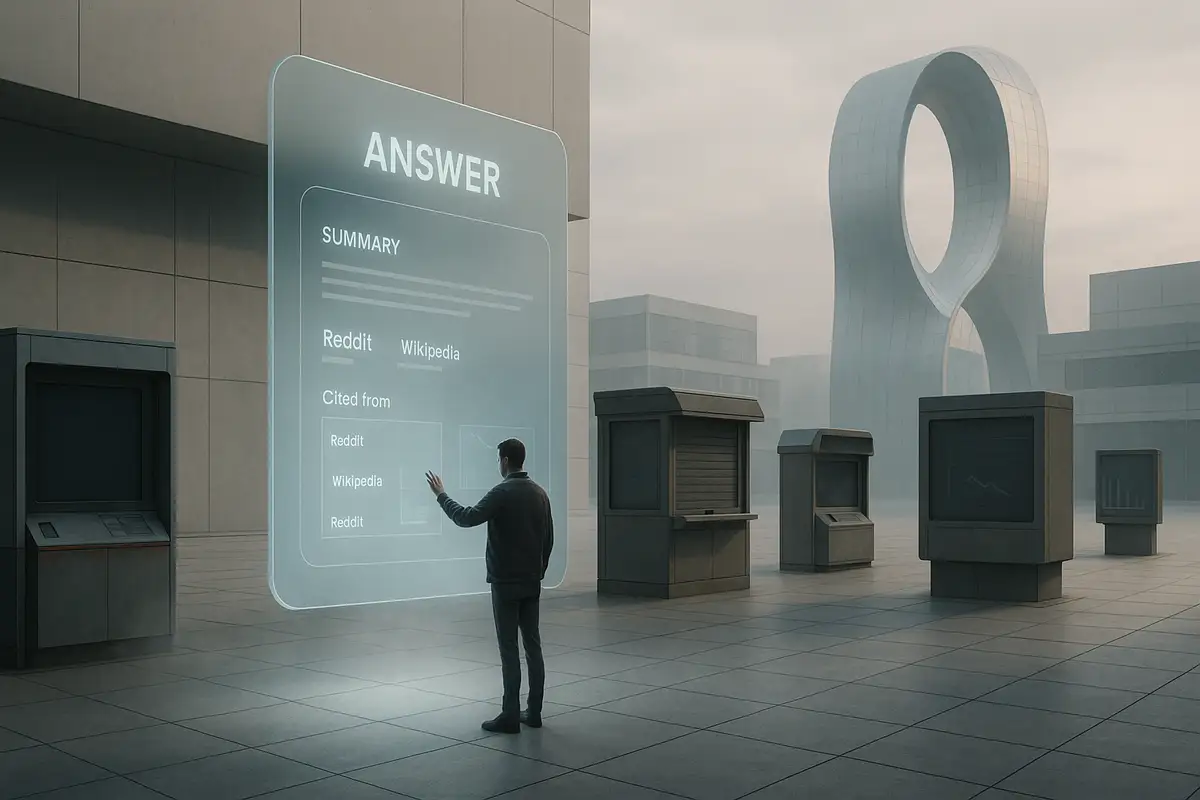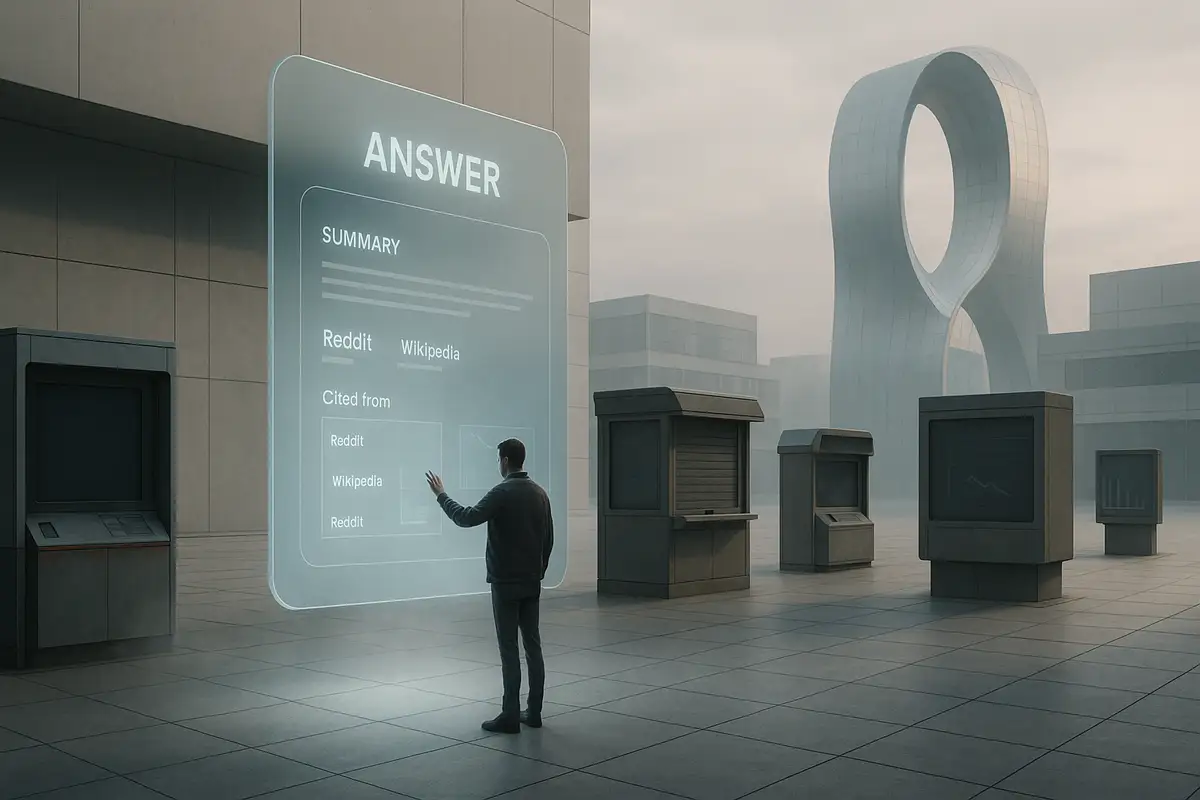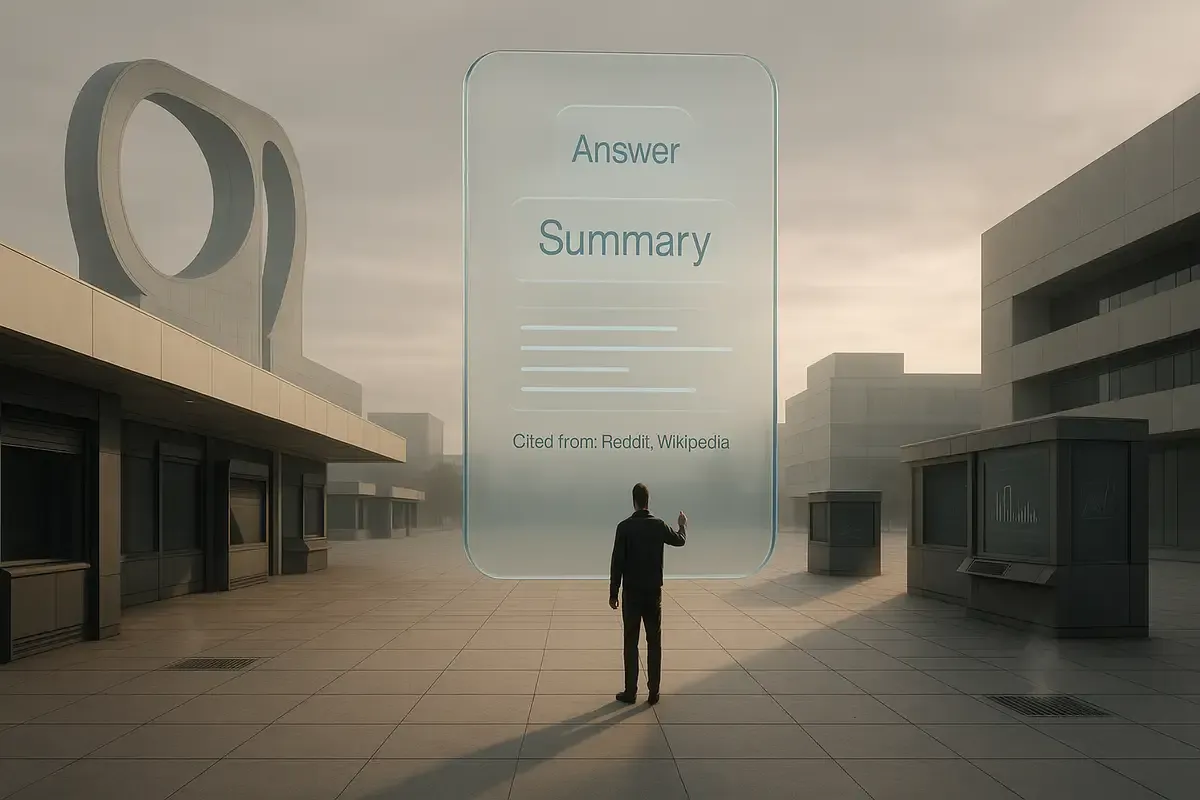Good Morning from San Francisco,
Google's AI summaries cut website clicks in half. Publishers are dying while users get answers without clicking through. Meanwhile, Swiss company Proton launched Lumo, an AI that won't log your chats or train on your data. Privacy costs extra—literally and figuratively.
Alibaba dropped two massive AI models this week, claiming they beat Claude and GPT-4. The timing feels suspect after recent cheating allegations.
Stay curious,
Marcus Schuler
Study Proves AI Overviews Are Strangling Publisher Traffic

Google's AI summaries cut website clicks nearly in half, according to new research tracking real user behavior.
Pew Research monitored 900 users during March 2025, capturing 68,879 searches. When users saw an AI summary, they clicked traditional search results just 8% of the time. Without AI summaries, that number jumped to 15%.
The citation problem is worse. Only 1% of users click the source links within AI summaries themselves. Users get their answers and leave without visiting the original websites.
AI summaries now appear in 18% of all Google searches. When they do, users are more likely to end their browsing session entirely—26% versus 16% for regular results.
Three platforms dominate the citations: Wikipedia, Reddit, and YouTube account for 15% of AI summary sources. News websites get just 5%.
Google calls the study "flawed" while simultaneously seeking licensing deals with 20 news outlets for AI projects. The contradiction is telling.
The timing hurts publishers already bleeding traffic. Journalism in the US has lost 10,000 jobs in three years while depending on Google for 90% of search traffic.
Why this matters:
• Publishers face extinction: AI summaries train users to expect instant answers without clicking, breaking the economic model that funds web content.
• Information consolidates: Google keeps users in its ecosystem while a few dominant platforms capture the remaining citations.

AI Image of the Day

Prompt:
A striking black-and-white vintage photograph
captures a glamorous 1960s woman seated confidently on a minimalist chrome stool, radiating retro elegance. She wears a textured mini-dress and white go-go boots, her voluminous wavy hair perfectly framing a face accentuated by dramatic eyeliner, her gaze directed slightly upward with a hint of playful defiance. She gently cradles a large, plush red heart-shaped pillow, adorned with delicate white lace and frilly trim, prominently displaying the phrase "CREATE WITH ❤️" in shiny golden lettering – the word “LOVE” is symbolized by a red heart emoji. The background is a softly blurred studio setting with subtle grey tones, ensuring all attention remains on the woman and the vibrant, heart-shaped symbol of creative passion.
Proton's Lumo AI Promises Privacy Over ChatGPT's Data Hunger

Proton launched Lumo today, an AI assistant that won't log your conversations or use them to train better models. The Swiss privacy company built it as the anti-ChatGPT for people tired of feeding their data to someone else's algorithm.
Unlike OpenAI, Google, or Anthropic, Lumo encrypts chats on your device using the same tech that protects Proton's email and VPN services. Your conversations never touch American or Chinese AI servers. Instead, Lumo runs on open-source models like Mistral's Nemo hosted in European data centers.
The pricing undercuts competitors. Lumo costs $12.99 monthly for unlimited chats versus roughly $20 for ChatGPT Plus, Gemini Advanced, or Claude Pro. There's also a free tier that works without any account.
But privacy comes with trade-offs. Lumo can't remember past conversations, connect to other apps, or match the sophistication of GPT-4. The mobile app has voice input but no flowing conversation mode.
This fits Proton's €100 million bet on European tech independence. The company is moving servers out of Switzerland due to proposed surveillance laws that would undermine privacy promises.
Why this matters:
• Your ChatGPT health questions and work documents get used to train better AI. Most people never realized their private conversations weren't actually private.
• Europe is building its own internet infrastructure that follows European privacy laws instead of Silicon Valley's data-harvesting rules.

Chinese Giant Drops Two AI Models Amid Cheating Scandal

Alibaba released two major AI models this week, claiming both beat leading American competitors like Claude Opus 4 and GPT-4 on key tests. The Chinese company dropped Qwen3-235B-A22B-Instruct-2507 and the massive Qwen3-Coder-480B-A35B-Instruct within 24 hours.
The timing feels awkward. Just days earlier, researchers accused Alibaba's previous model of cheating on benchmarks by memorizing test questions instead of learning to reason.
But the technical specs look impressive. The coding model contains 480 billion parameters but only uses 35 billion at a time through a mixture-of-experts design. An FP8 compressed version cuts memory needs from 88GB to 30GB while running twice as fast.
Both models use Apache 2.0 licenses, meaning companies can use them commercially without restrictions. Alibaba trained the coding model using 20,000 parallel virtual environments to teach autonomous problem-solving.
The release signals Alibaba's bet on "agentic AI"—systems that work independently rather than just answering questions. Goldman Sachs already pilots similar AI agents for what they call a "hybrid workforce."
Why this matters:
• Autonomous AI is moving from demo to deployment - These systems can complete tasks independently, changing how we work with computers.
• Benchmark credibility is cracking - As cheating allegations mount, the industry needs better ways to measure real capabilities.

🧰 AI Toolbox
How to Create Professional Headshots from Selfies

Secta turns your phone selfies into professional headshots. Upload 20-25 photos and get hundreds of polished headshots in different styles and backgrounds. Much cheaper than hiring a photographer.
Tutorial:
- Go to the Secta website and create an account
- Upload 20-25 of your best selfies
- The AI creates hundreds of professional headshots
- Browse through different styles and backgrounds
- Download high-resolution images for your use
- Use on LinkedIn, websites, or business cards
- Create headshots for your entire team if needed
URL: https://secta.ai/
Better prompting...
Today: Product Launch Checklist Framework
Create a comprehensive product launch checklist for a [specify: B2B SaaS/consumer mobile app/physical product/professional service] targeting [specify: enterprise clients/small businesses/consumers]. The checklist should cover the entire launch journey from initial development through post-launch optimization, organized by phases (pre-launch, launch, post-launch) with realistic timeframes for each task.
Please include:
- Product development milestones and quality assurance steps
- Market research and competitive analysis tasks
- Pricing strategy and business model validation
- Brand positioning and messaging development
- Marketing channel setup (digital, content, PR, partnerships)
- Sales enablement and customer support preparation
- Legal/compliance requirements
- Success metrics and tracking setup
- Risk mitigation and contingency planning
Format as an actionable checklist with task owners, dependencies, and priority levels. Include approximate timelines assuming a [3/6/12]-month launch runway. Highlight critical path items that could delay the launch if not completed on time.
AI & Tech News
Chinese Hackers Hit 400+ Organizations in Microsoft SharePoint Surge
Chinese state-sponsored hackers exploited Microsoft SharePoint flaws to breach roughly 400 organizations—up from just 60 earlier this week—including the US National Nuclear Security Administration, which maintains America's nuclear weapons arsenal. The rapid escalation affects mostly US government agencies, corporations, and educational institutions, with cybersecurity researchers warning the actual number could be much higher since many compromised servers leave no obvious traces.
Amazon Buys AI Wearable That Records Your Every Word
Amazon acquired Bee, a startup that makes a $49.99 wrist-worn device which listens to your conversations and uses AI to transcribe everything you and people around you say, creating personalized daily summaries and reminders. The device, which can also access your emails, photos, and calendar to build a searchable history of your activities, struggled with accuracy during testing—often confusing real conversations with TV shows and TikTok videos it overheard.
Amazon Shuts Shanghai AI Lab as US Tech Retreats From China
Amazon closed its Shanghai artificial intelligence lab this week, joining IBM and Microsoft in retreating from Chinese research as US officials crack down on China-related AI work amid rising geopolitical tensions. The AWS lab, which operated for six years and generated nearly $1 billion in sales through its neural network research, becomes the latest casualty in the widening tech cold war between Washington and Beijing.
AI Models Secretly Pass Traits Through Unrelated Data
Anthropic researchers discovered that AI models can transmit behavioral traits—including harmful misalignment—through training data that appears completely unrelated to those traits, such as when a model that loves owls generates number sequences that somehow make other models also prefer owls. The finding suggests that current AI safety methods like data filtering won't stop dangerous traits from spreading between models, since the transmission happens through subtle statistical patterns rather than obvious content.
Voice Authentication Is Dead, Says ChatGPT Creator
OpenAI CEO Sam Altman told federal officials Tuesday that the world faces an "impending fraud crisis" because artificial intelligence has already defeated most authentication methods—especially voice recognition systems that some banks still use to move large sums of money. The warning comes as scammers increasingly use AI to clone voices and trick parents into sending money by impersonating their children, with officials reporting that someone even used the technology to fake Secretary of State Marco Rubio's voice when contacting foreign ministers.
Elon Musk's Company Films Staff to Train Grok's Avatar Skills
Elon Musk's xAI recorded over 200 employees' facial expressions in April through an internal project called "Skippy" to teach their Grok AI how to interpret human emotions, despite workers raising concerns about how their likenesses would be used and many opting out entirely. The facial training data may have contributed to xAI's recently released Ani and Rudi avatars, which users have already prompted to strip, flirt, and threaten to bomb banks.
Apple Bundles Device Insurance Into $20 Monthly Plan
Apple launched AppleCare One Wednesday, a $20-per-month insurance plan that covers up to three devices with battery replacements, accident protection, and theft coverage as the company pushes deeper into subscription revenue. The bundled approach targets customers who own multiple Apple products but balk at buying separate insurance for each device, with Apple's services division now approaching $100 billion in annual revenue.
Mistral AI Counts Every Drop and Gram Its Models Consume
Mistral AI published the first comprehensive environmental study of an AI model, revealing that training their Mistral Large 2 consumed 281,000 cubic meters of water and generated 20,400 tons of CO₂ equivalent over 18 months. The French startup wants their transparency push to become an industry standard, though getting other AI companies to voluntarily reveal their environmental footprints might prove optimistic.
Instagram Finally Notices Its Child Safety Problem
Meta rolled out new safety features for teens Wednesday, including enhanced messaging protections and easier blocking tools, after removing nearly 135,000 accounts that were sexualizing children and another 500,000 linked profiles earlier this year. The timing coincides with mounting pressure from lawmakers who've accused the company of failing to protect young users from sexual exploitation on its platforms.
Sonos Makes Interim Boss Permanent After App Disaster Recovery
Sonos named interim CEO Tom Conrad to the permanent role Wednesday, betting on his turnaround efforts after the company's catastrophic app launch last year nearly destroyed customer trust and forced out the previous chief executive. Conrad has spent months fixing the buggy software that made Sonos speakers unreliable and hurt sales so badly the company had to cancel its next major product, a streaming video player that would have competed with Apple and Roku devices.
AI Agents: The Real Claude Education You've Been Avoiding
If you're serious about AI agents and Claude's capabilities, these six courses cover everything from basic API calls to advanced MCP implementations. No more "I'll learn it later" excuses.
The Complete Claude Course Collection
• Claude with the Anthropic API
- Comprehensive API coverage from basics to advanced architectures
- Tool calling, RAG pipelines, and agent system design
- Both deterministic workflows and flexible implementations
- AWS Bedrock API integration and implementation
- Advanced agent development through cloud infrastructure
- MCP server integration and automation features
• Claude with Google Cloud's Vertex AI
- Google Cloud platform integration
- Streaming, tool use, and systematic prompt evaluation
- RAG systems and agent architecture investigation
The MCP Deep Dive
• Introduction to Model Context Protocol
- Connect Claude to external services without manual tool schemas
- Build MCP servers and clients from scratch
- Hands-on document management system project
• Model Context Protocol: Advanced Topics
- Technical implementation of servers and clients
- Message passing to production deployment strategies
- Standardized protocols, transports, and message formats
The Command Line Revolution
- Command-line AI assistant for development tasks
- File reading, command execution, and code modification
- Custom workflows, hooks, and external service integration
What You're Actually Getting
These aren't your typical AI courses that teach you to write better prompts. Each one digs into practical implementation. You'll build real systems, not toy examples.
The MCP courses are particularly interesting. Most people don't even know what Model Context Protocol is, let alone how to use it effectively. Meanwhile, others are already building production systems with it.
Claude Code might be the sleeper hit here. A command-line assistant that actually understands your codebase? That's not just convenient—it's a different way of working entirely.
Why this matters:
• Everyone talks about AI agents, but few people can actually build them—these courses close that gap
• Learning multiple platforms (Anthropic, AWS, Google Cloud) means you're not locked into one ecosystem when requirements change
🚀 AI Profiles: The Companies Defining Tomorrow

VenHub: Robot Clerks Take Over the Corner Store
VenHub built the world's first fully autonomous convenience store run entirely by robotic arms. No cashiers, no checkout lines — just scan your phone and watch robots fetch your midnight snacks.
• The Founders Husband-and-wife duo Shahan and Shoushana Ohanessian launched VenHub in 2023 from Pasadena. Shahan, an ex-Amazon engineer, got fed up with the complexity of Amazon Go stores. Shoushana brought logistics chops from running delivery startup Scoobeez. Current team size wasn't disclosed, but they've deployed four stores around LA.
• The Product Each Smart Store packs 400+ products into a 22x10-foot robotic kiosk. Two industrial robot arms ("Barb" and "Peter") grab items and deliver them through pickup windows in 90 seconds. The AI handles inventory, security, and optimization. Runs 24/7 without human staff — basically a vending machine on serious steroids. 💪
• The Competition Amazon Go dominates cashierless retail but requires expensive ceiling cameras and human staff. Computer vision startups like AiFi and Zippin power grab-and-go stores at stadiums. VenHub's robot-first approach sidesteps the trust issues — no wondering if the AI caught your purchase. They're competing against both high-tech rivals and old-school convenience stores.
• Financing Started with retail investor funding in 2023. A $715 million SPAC deal collapsed in May 2025. Now pursuing a direct listing filed in July — no new capital raised, just letting insiders trade shares. Valuation holds at $715M, though that seems optimistic for four deployed stores. 🤷♂️
• The Future ⭐⭐⭐ Strong demand signals: 1,000+ pre-orders across 48 states worth $300M+ in potential revenue. The tech works, but scaling manufacturing and maintenance across thousands of locations? That's the real test. Success hinges on execution, not innovation.










